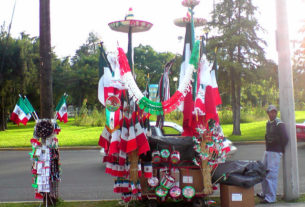A. INTRODUCTION:
The intellectual property of a business may be the most important asset that the business owns. The distinctive creation, invention, method or recognition of a company is the result of investing personnel and financial resources to obtain its competitive advantage. This property must be adequately protected so a business can have the confidence that its competitive advantage will not be stolen, counterfeited, or used without permission. The intellectual property protected under the North American Free Trade Agreement (NAFTA) includes:
- copyright of data; including computer programs
- copyright of sound recordings
- trademarks – a name or design or logo under which business is conducted
- patents or inventions
- layout designs of semi-conductor integrated circuits – industrial designs
- trade secrets – secret information used in carrying out business
- geographical indications – use of words or pictures indicating where a good originates
- protection of satellite signals and devices to intercept signals
B. MINIMUM STANDARDS:
NAFTA sets out the minimum standards of protection of intellectual property that the United States, Canada and Mexico must provide for in their domestic laws. The minimum standards include those set out in the provisions of the following international agreements:
- Geneva Convention for the Protection of Phonograms Against Unauthorized Duplication of
- their Phonograms 1971
- Berne Convention for the Protection of Literary and Artistic works 1971
- Paris Convention for the Protection of Industrial Property 1967
- International Convention for the Protection of New Varieties of Plants 1978
The United States, Canada and Mexico may provide more protection than is required under NAFTA.
C. SPECIFIC PROTECTION – COPYRIGHT:
Authors or owners of exclusive rights to books, sound recordings, computer software or other works of original expression can register these rights in Mexico for fifty years to protect exclusive distribution and reproduction rights. You may transfer or license the copyright on privately negotiated terms.
D. TRADEMARKS:
Trademarks may be registered for a ten year term, renewable for an unlimited number of ten year terms as long as the trademark is still being used. (Paris Convention).
E. TRADE NAMES & SLOGANS:
There is no system of regulation in Mexico for trade names and slogans. However, publication in the Mexican government Gazette establishes a presumption that you are using the tradename or slogan in good faith. Such a presumption, which lasts ten years, could be critical in a legal action about the use of that trade name or slogan.
F. PATENTS:
Patents for inventions that are new, non-obvious and have industrial applications may be registered for twenty years by a company using the patented product. NAFTA allows the federal governments to exclude the following from patentability:
- plants and animals other than micro-organisms
- diagnostic, therapeutic and surgical methods for treatment of humans or animals
- essential biological processes for the production of plants or animals
Patents may be licensed on privately negotiated terms. The Mexican 1991 Law for the Promotion and Protection of Industrial Property provides for patenting of a broad range of inventions, including chemicals, plant varieties and biotechnological processes. Under the Industrial Property law patents last for twenty years.
F. TRADE SECRETS:
Trade secrets under Mexican law are defined as confidential information safeguarded to maintain a competitive advantage, where the company has adopted means and methods to preserve such confidentiality. No registration is required to prevent individuals who have such secrets from disclosing them. Such individuals and other companies who hire those individuals to gain the information may be subject to penalties for disclosure of trade secrets.
G. ENFORCEMENT
Enforcement of intellectual property rights is governed by the domestic laws of the country in which the rights are sought to be enforced. Mexico has a legal system to enforce intellectual property rights that includes civil remedies by Mexican authorities, including criminal sanctions for willful counterfeiting or piracy on a commercial scale. NAFTA requires that the civil actions conform with the numerous legal standards which are familiar to Americans and Canadians, including:
- representation by independent legal counsel
- judicial review of administrative decisions
- procedures to identify and protect confidential information
- orders to cease the infringement
- awards of damages and costs of the action
NAFTA also requires procedures to be available to a right holder to apply to have counterfeit or pirated goods not to be released from customs.
This article is electronically reproduced with permission from the
Mexico 2000 Business Directory Your Passport to Mexican Business

